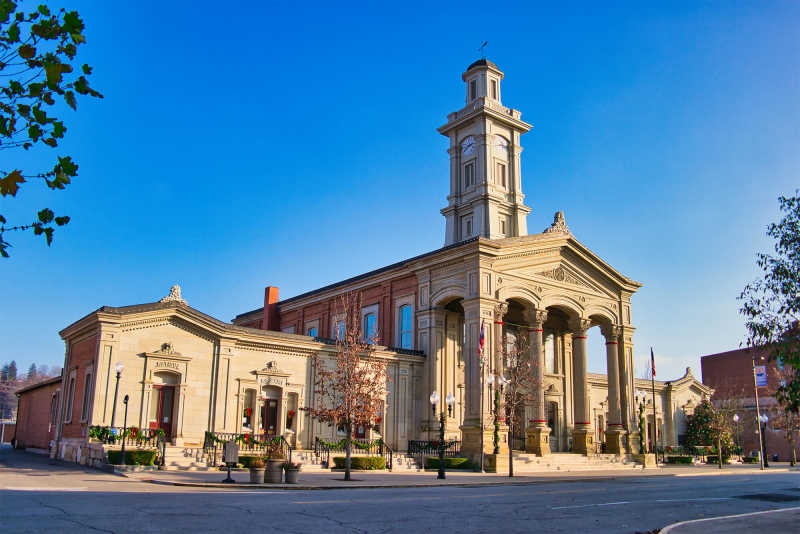
How Does a Federal Appellate Case Differ From Trial Court Procedures?
An appellate court's purpose is to review the legal aspects of a case, primarily focusing on whether the trial court made errors in interpreting or applying the law. This differs from a trial court, which is responsible for determining the facts of a case through the presentation of evidence, witness testimony, and legal arguments.
Appellate courts don't hear new evidence or witness testimony but instead rely on the trial court's record to assess legal issues, including procedural fairness, statutory interpretation, and constitutional matters.
At Sigall Law Firm in Chillicothe, Ohio, I'm committed to providing skilled appellate representation, making sure that your case is thoroughly reviewed. With a deep understanding of appellate law, I work tirelessly to protect your rights and secure the best possible resolution for your case.
By reviewing the key differences between trial courts and appellate courts, you’ll be better prepared to face this important stage of the legal process.
The Purpose of Trial Courts
Trial courts are where cases begin. Their primary role is to determine the facts of a case and apply the law to reach a verdict. This process typically involves presenting evidence, examining witnesses, and arguing the merits of the case before a judge or jury.
In a trial court, the focus is on uncovering the truth about what happened. Both sides present their versions of events, and the court decides the outcome based on the evidence and applicable law. Trial courts handle a wide range of cases, including criminal, civil, and family law matters.
Once the trial court has reached a decision, parties dissatisfied with the outcome may seek a review by filing an appeal. Let’s now explore how appellate courts differ from this initial process.
The Goal of Appellate Courts
Federal appellate courts serve a different purpose. Rather than determining facts, they review legal decisions made by trial courts to identify and address potential errors. Appellate courts focus on the application of the law, examining whether the trial court correctly interpreted statutes, case law, or procedural rules.
Appellate cases don't involve witnesses, evidence, or juries. Instead, they rely on written briefs and oral arguments from attorneys. The appellate judges, often a panel of three, analyze these submissions and issue a written opinion that resolves the appeal.
Understanding the role of appellate courts highlights their importance in maintaining consistency and fairness in the legal system. Let’s now discuss some of the procedural differences between trial and appellate cases.
Procedural Differences Between Trial and Appellate Cases
The processes in trial and appellate courts differ significantly. A few key distinctions to keep in mind include:
Focus on the record: Appellate courts base their review on the trial record, which includes transcripts, exhibits, and filings. They don't consider new evidence or testimony.
Written briefs: In appellate cases, written briefs play a central role. These documents outline the legal arguments and point to specific errors made during the trial.
Oral arguments: While trial courts involve extensive testimony and questioning, appellate oral arguments are limited. Attorneys present their cases to the judges, who may ask questions to clarify points.
No jury: Appellate courts don't use juries. Decisions are made solely by the judges based on legal principles.
These procedural differences reflect the unique purpose of appellate courts in reviewing trial court decisions. Let’s now look at the types of issues commonly addressed in appellate cases.
Common Issues in Federal Appellate Cases
Appellate courts focus on identifying and correcting errors in trial court proceedings. Common issues addressed in federal appellate cases include:
Misinterpretation of the law: Appellate courts review whether the trial judge applied the law correctly in deciding the case. This often involves analyzing how the trial court interpreted statutes, case law, or regulations. A misapplication of legal principles can result in significant consequences for the parties involved.
Procedural errors: Mistakes in jury instructions, evidence admission, or courtroom procedures may form the basis of an appeal. These errors can affect the fairness of the trial and may lead to an incorrect verdict. Highlighting these procedural mistakes is essential to demonstrating how they impacted the case.
Constitutional questions: Appeals often involve challenges to the constitutionality of a law or the fairness of a trial process. These cases can have broad implications, as they may address fundamental rights or government powers. Constitutional issues are frequently central to high-stakes decisions.
Sufficiency of evidence: In some cases, appeals argue that the trial court’s decision wasn't supported by sufficient evidence in the record. This claim asserts that no reasonable fact-finder could have reached the same conclusion based on the evidence presented.
Understanding these issues helps clarify the scope and purpose of appellate court reviews. Let’s now address some frequently asked questions about federal appellate cases.
Frequently Asked Questions About Federal Appellate Cases
Clients often have questions about how appellate cases work and what to expect during the process. Here are answers to some of the most common inquiries:
Can new evidence be introduced in an appeal?
No, appellate courts only review the trial record and don't accept new evidence or testimony.How long does the appellate process take?
The timeline varies but can take several months to a year, depending on the court’s schedule and the intricacy of the case.Do I need an attorney for an appeal?
While it’s not required, having an attorney experienced in appellate law can significantly improve your chances of success.What happens if I win my appeal?
The appellate court may reverse the trial court’s decision, remand the case for further proceedings, or modify the judgment.Can I appeal the appellate court’s decision?
In some cases, you can petition a higher court, such as the U.S. Supreme Court, though review is granted only in select cases.
These answers provide a clearer picture of what to expect during the appellate process. Let’s now consider how to approach an appeal effectively.
Preparing for a Federal Appeal
Preparing for an appeal requires a thorough understanding of the trial record and the legal issues at stake. The following steps are essential:
Review the trial record: Carefully examine transcripts, filings, and exhibits to identify potential errors that may support an appeal. This step is crucial because appellate courts base their review solely on the trial record. Identifying relevant errors early allows you to build a strong foundation for your arguments.
Draft a strong brief: Your appellate brief should clearly outline the legal issues, reference relevant case law, and explain how the trial court erred. The brief is your primary tool for persuading the appellate judges to rule in your favor. It should be well-organized and present a logical, compelling narrative.
Practice oral arguments: If your case includes oral arguments, rehearse presenting your points concisely and answering judges’ questions. Anticipating the judges’ concerns and preparing thoughtful responses can strengthen your case.
Work with an attorney: An experienced appellate attorney can help you craft persuasive arguments and avoid common pitfalls. They can also provide valuable knowledge of the court’s procedures. Collaborating with a knowledgeable attorney can significantly improve your chances of success.
By following these steps, you can present a compelling case for appellate review. Federal appellate cases differ significantly from trial court proceedings, focusing on legal errors rather than factual disputes. By understanding the roles and processes of each court, you can better handle the transition from trial to appeal.
Contact a Federal Appellate Attorney Today
If you need legal assistance during federal appellate cases, don't hesitate to reach out to me, Attorney Ben Sigall. I serve clients in Chillicothe and throughout Ohio. Contact Sigall Law Firm today to schedule a consultation.
